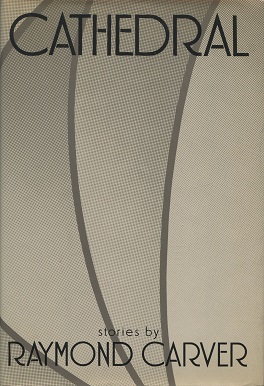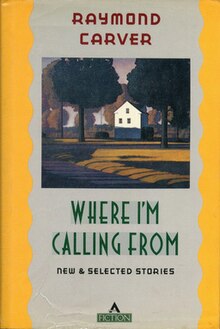
The Pulitzer Prize for Fiction is one of the seven American Pulitzer Prizes that are annually awarded for Letters, Drama, and Music. It recognizes distinguished fiction by an American author, preferably dealing with American life, published during the preceding calendar year.

Richard Ford is an American novelist and short story author, and writer of a series of novels featuring the character Frank Bascombe.
This article contains information about the literary events and publications of 1988.

Raymond Clevie Carver Jr. was an American short story writer and poet. He published his first collection of stories, Will You Please Be Quiet, Please?, in 1976. His breakout collection, What We Talk About When We Talk About Love (1981), received immediate acclaim and established Carver as an important figure in the literary world. It was followed by Cathedral (1983), which Carver considered his watershed and is widely regarded as his masterpiece. The definitive collection of his stories, Where I'm Calling From, was published shortly before his death in 1988. In their 1989 nomination of Carver for the Pulitzer Prize for Fiction, the jury concluded, "The revival in recent years of the short story is attributable in great measure to Carver's mastery of the form."
Tess Gallagher is an American poet, essayist, and short story writer. Among her many honors were a fellowship from the Guggenheim Foundation, National Endowment for the Arts award, Maxine Cushing Gray Foundation Award.
"Where I'm Calling From" is a short story by American author Raymond Carver. The story focuses on the effects of alcohol. Throughout this story Carver experiments with the use of quotation and meditates on the healing factors of storytelling. "Where I'm Calling From" was originally published by The New Yorker magazine in their March 15, 1982 issue. It was later collected in Cathedral (1983). The story also lends its title to a collection of thirty-seven short stories compiled by Carver, Where I'm Calling From: New and Selected Stories (1988).

Marilynne Summers Robinson is an American novelist and essayist. Across her writing career, Robinson has received numerous awards, including the Pulitzer Prize for Fiction in 2005, National Humanities Medal in 2012, and the 2016 Library of Congress Prize for American Fiction. In 2016, Robinson was named in Time magazine's list of 100 most influential people. Robinson began teaching at the Iowa Writers' Workshop in 1991 and retired in the spring of 2016.
Gordon Lish is an American writer. As a literary editor, he championed many American authors, particularly Raymond Carver, Barry Hannah, Amy Hempel, Rick Bass, Tom Spanbauer, and Richard Ford. He is the father of the novelist Atticus Lish.

Will You Please Be Quiet, Please? (1976) was the first major-press short-story collection by American writer Raymond Carver. Described by contemporary critics as a foundational text of minimalist fiction, its stories offered an incisive and influential telling of disenchantment in the mid-century American working class.

What We Talk About When We Talk About Love is a 1981 collection of short stories by American writer Raymond Carver, as well as the title of one of the stories in the collection. Considered by many one of American literature's most ambitious short-story collections, it was this collection that turned Raymond Carver into a household name in the publishing industry.

Cathedral is the third major-press collection of short stories by American writer Raymond Carver, published in 1983. It received critical acclaim and was a finalist for the 1984 Pulitzer Prize for Fiction.

Elephant and Other Stories (1988) is the last collection of short stories by American writer Raymond Carver. They were the final seven stories Carver wrote before his death, and only appeared as a separate book in Great Britain. The book was published by Collins Harvill in London on August 4, 1988, two days after Carver's death.
"Chef's House" is a short story written by Raymond Carver.

Michael Hemmingson was a novelist, short story writer, literary critic, cultural anthropologist, qualitative researcher, playwright, music critic and screenwriter. He died in Tijuana, Mexico on 9 January 2014. The reported cause was cardiac arrest.
"Popular Mechanics" is a short story by American writer Raymond Carver. It was originally titled "Mine" and first appeared in Carver's 1977 collection Furious Seasons and Other Stories. It was then republished as "Little Things" in Fiction, as "Mine" again in Playgirl, as "Popular Mechanics" in Carver's 1981 collection What We Talk About When We Talk About Love, and again as "Little Things" in Carver's 1988 collection Where I'm Calling From: New and Selected Stories. There are minor revisions between the version of "Mine" in Furious Seasons and the version published as "Popular Mechanics".
Dennis Schmitz was an American poet.

Carol Sklenicka is an American biographer and literary scholar known for her authoritative, full-scale biographies of two important figures in late twentieth-century American literature: acclaimed short story masters Raymond Carver and Alice Adams.
The bibliography of Raymond Carver consists of 72 short stories, 306 poems, a novel fragment, a one-act play, a screenplay co-written with Tess Gallagher, and 32 pieces of non-fiction. In 2009, the 17 stories collected in What We Talk About When We Talk About Love were published in their manuscript form, prior to Gordon Lish's extensive editing, under the title Beginners.

Patricia Morrisroe is an American journalist and author, best known for writing the biography of Robert Mapplethorpe. Her writing has appeared in The New York Times, Vogue, New York Magazine, and others.
"Why Don't You Dance?" is a short story by American author Raymond Carver. It was published in the Spring 1981 edition of The Paris Review and that same year in the short story collection What We Talk About When We Talk About Love.











